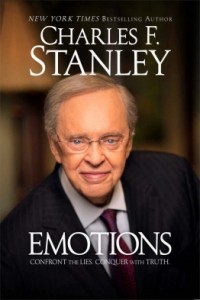
“The strongest man who ever lived – our Savior, Jesus – experienced and showed very deep emotion.”
-Charles Stanley, Emotions
Try to have a serious conversation about feelings – unless of course you’re in a therapist’s office – and you’ll run into two possible ditches. The first typically comes from men, who start shuffling uncomfortably and muttering something about not being very emotional. They are emotional, of course, but to this crowd, emotions are what you have when the power goes out with two minutes to go in a tight Super Bowl. At best, emotions are something you deal with, but certainly not something you talk about, for crying out loud.
The other ditch tends to be populated more by women, and treats emotions as little gods or dictators of our state, against which we are powerless to do anything except bow down. Their banner: “I can’t help it – it’s just the way I feel.” When Debby Boone sang, “It can’t be wrong if it feels so right,” this crowd wiped a tear and lit a candle.
That’s why I’m glad Charles Stanley has brought some truth and balance to the conversation in his new book, Emotions: Confront the Lies, Conquer With Truth. Dr. Stanley profoundly shaped my life and ministry with a sermon series on the same subject many years ago. Through him I learned, among other things, that all emotions are God-given, and it’s healthy to get a grasp on what their original purpose was/is. Also, however, all emotions are also sin-corrupted. Because of that, many people live in the grip of painful, devastating emotions that they feel powerless to overcome. [click to continue…]

Yes, this is me mocking my grandson. Or maybe Cason's mocking me. Hmmm.
Tucked away in the third stanza of a familiar hymn, Fannie Crosby penned these lines that were years ahead of her time:
Down in the human heart, Crushed by the tempter,
Feelings lie buried that grace can restore.
Except for the grace of God, every single one of us will go to our graves feeling guilty about our feelings. Can you relate to any of these?
- “I didn’t love my mother enough.”
- “I hate my father.”
- “I don’t like being a mother.”
- “I will never forgive her as long as I live.”
- “I love one of my children more than the other.”
- “Why can’t he just die?”
One person has said, “Emotions are what we have the most of, and know the least about.” One of the longest, and most frustrating searches that many people have is why do I feel the way I feel, and what can I do about it?
On the other hand, some people (stupidly) dismiss all that and passively allow themselves to be led around by their feelings as if they are helpless to do anything about them. Ever hear something like this? [click to continue…]
 How do you want to be remembered?
How do you want to be remembered?
By what you did? What you said? Who and how you loved? What you accomplished or overcame?
That may or may not happen.
I was chatting with someone yesterday about the idea of legacy – one of those Five Laws of LifeVesting. He asked me to clarify what I meant and how people leave legacies after their time on earth is done. I said that legacy has two parts – the intentional and the unplanned.
There are some things I want to be remembered for, and I take action to make those memories while I still have a chance by investing my life in things that will live on after me. This is why people give money, write things, do art or music, or make memories with people, just to name a few.
But your legacy has a life of its own, and you’re making memories all the time, whether you realize it or not. Some of those are pretty routine. Some are painful. Some are glorious, and you don’t even know it.
Two days ago I got an email from Gotta-Love-Google-Land. It came from somebody I knew in my very first church staff position, 33 years ago. The message, framed with “thank you,” contained some profound memories. What was interesting, though, was what all those memories had in common. [click to continue…]
(Time Leadership, Part 2)
 What kept Jesus on the cross?
What kept Jesus on the cross?
That’s been the subject of many a sermon or song. And the answer is always the same, ranging somewhere between the ugliness of our sin and the beauty of His love.
You know He could have come down, don’t you? When He was mocked and taunted, Jesus could have called a legion of angels and put an end to the whole shebang.
But He didn’t. So what kept Him there?
Hint: the answer to the question is not, “love.” [click to continue…]
 This just in… modern newlyweds are increasingly dealing with “the bridal blues.” Doctors report that the expectations of newlyweds are so high, and married life such a letdown after all the planning and excitement of the big day, that an increasing number of brides are suffering post-nuptial depression. The feelgood factor fades so fast that up to 10 per cent of couples suffer enough remorse, sadness or frustration to seek counseling.
This just in… modern newlyweds are increasingly dealing with “the bridal blues.” Doctors report that the expectations of newlyweds are so high, and married life such a letdown after all the planning and excitement of the big day, that an increasing number of brides are suffering post-nuptial depression. The feelgood factor fades so fast that up to 10 per cent of couples suffer enough remorse, sadness or frustration to seek counseling.
Wow. You mean it wasn’t whispy clouds and fairy dust as you lived happily ever after? And Franck Eggelhoffer isn’t there to plan the details of your marriage like he did your wedding? And Daddy’s not there to pay your bills? And sex doesn’t cure everything, or come with an orchestra in your bedroom? And to add insult to injury, you find yourself married to a sometimes-sweaty, stinky boy, who leaves socks and underwear on the floor? Or to a woman, who – get this – ain’t yo’ mamma, your maid, or your madame? She’s no Cinderella, and you’re not exactly Prince Charming.
Those expectations take you for a ride sometimes, don’t they?
Dr. Terry Eagan has a name for post-wedding depression. He calls it the secret sadness. Why? Because the women who suffer from it are often too embarrassed to tell anybody. And men simply bottle up their feelings.
The Secret Sadness is real. And it isn’t limited to newlyweds. [click to continue…]




